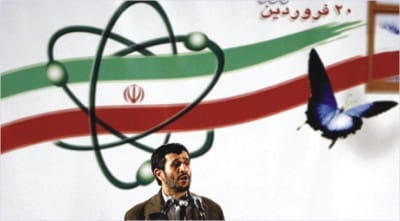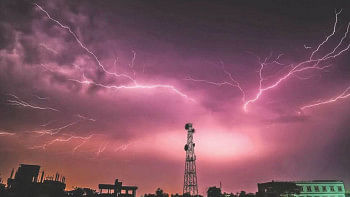Hot heads, what next?

Photo: AFP
Talks between Iran and the P5+1 group - the five permanent UN Security Council members plus Germany may take place in Istanbul on April 13 and 14 or any other date in the following days with an objective of seeking a prospective solution to the alleged nuclear program of Iran. Sergei Ryabkov, deputy foreign minister of Russia told the Interfax news agency ten days before the upcoming talks, "There are hotheads who…talk about the possibility of resorting to force." Hotheads are those among the US, Israeli and EU political leaders and policy makers, who are likely to rejoice hot war with Iran. The hotheads in the US, to satisfy the hotheads in Israel, have clarified their position that Iran would be attacked if it does not agree with their demands.
Against this backdrop, the question that has engrossed the people in general and International Relations (IR) experts in particular is whether Iran will be victim of the western aggression.
There are two strands of thoughts in this regard. The first group of scholars is of the opinion that none of the West or Israel or Iran is capable of warring with Iran because of the discrepancy of national consensus, psychological stimuli and the lack of domestic, regional as well as international recognitions for such a dangerous war. Second, the policy makers and politicians of both the US and Israel have diverge opinions with regard to the strategies, goals and policies of a prospective Western attack on Iran. Third, the West cannot underestimate the Russian and Chinese anti-war postures. Fourth, the devastating experiences of Iraq and Afghanistan wars will undoubtedly prevent the West from engaging in another suffocating shambles of the Iran war. Fifth, US debt burden of 15 trillion dollar and the acute economic crises of Europe may not encourage them to instigate another expensive expedition.
The above arguments may be true if the Western policy is driven by the Rational Actor Model of Graham T. Allison of Harvard. However, the possibility of any Western attack may not be dismissed just before the US presidential election and particularly, such an attack may deem more important in view of the declining the US-Israel relations caused by the Iran issue. This leads to the second group of analysts, who foresee surgical operations or preemptive air-strikes on Iran.
The first and the foremost among their arguments are related to the revitalization of the global grand image of the US and the West. In the beginning of 2012, the Daily Mail, referring to the Israeli intelligentsia, terrified the world by conveying the dreadful news that Iran would come under Western attack in a festive mood before Christmas. Iran has been, since then, continuously threatened with Christmas attack, winter attack, spring attack, Israeli attack or US attack. Iran has responded to these hawks with counter-threats in eloquent and decisive voices. Moreover, couples of the UN sanctions, the bank restriction of the US, the oil embargo of Europe and the trade threats of the West - none of these steps have been instrumental in stopping Iran's nuclear project. The sheer disgrace out of these frustrating failures may tickle the sleeping tigers in the 'hot heads' of Israel or US to trigger onslaughts on Iran.
The second important reason of a potential Iran war emanates from the fact that the West cannot tolerate any countervailing power in Middle East that may pose challenge to Israel, the West's long-tested ally in the region. The concern, that Iran's rapidly developing nuclear programme will turn it into a nuclear power, will compel them to stand strongly against an egotistical Iran. Such calculation may start the strategy of limited war through surgical attacks in order to frighten Iran and, upon desired success, the concerted strategy of total war will be declared by the West to dethrone the present Iranian leaders or destroy Iran from the world atlas.
The third reason reflects the impatience of the West. Barack Obama and Hillary Clinton have both publicly said that the window for dialogue in the standoff over Iran's nuclear program is closing. The mid April talks are seen as the last chance for diplomacy in its showdown with the West. In his interview with the Atlantic news magazine, Obama said that he would command US army to launch military strikes against Iran if dialogue and sanctions failed to curb Iran's nuclear ambitions.
The fourth reason why Obama will choose the option of war is because he might want to cling to people's sentiment in order to win the electoral race on his republican rivals including Mitt Romney. The psyche of American people comprises with self-contradictory elements in that, on one hand, they chant anti-war slogans and on the other, they long for seeing the pomp of power of their president. Ahead of the upcoming election, he might turn crazy to show the countrymen his military muscles.
I don't think that the option of war is easily achievable, given the changed realities of the regional and global political spectrum. First, the US may have limited success in the Iraq and Afghanistan wars. However, it will be quite difficult to survive in the Iran war. The attributes of political leaders, domestic political setting and political culture of Iran are different from those of Iraq and Afghanistan. The Iranian politicians are highly popular; their popularity is derived from the grassroots levels. A Maliki or a Karzai may not be available in Iran to serve as Western puppets. Liberals like Rafsanjani and others are committed to preserving Iranian and Islamic values. The conservatives, even the extremists are not opposed to peaceful coexistence if their relationship with the West is built on mutual respect and cooperation. Mahmood Ahmadinejead, the present Iranian president stands as the moderate Islamist in between these two.
Second, the Western threats could hardly do any harm to Iran. For example, The IMF President has recently acknowledged that Iran has not been expectedly affected by the Western sanctions; rather the West has been suffering a lot. He warned of the virulent economic crisis along with the present economic recession around the globe. Despite embargo, Iran vows to stick to its nuclear projects.
Third, Iran seems to have possessed capability of challenging Western threats. Iran declared on April 2 that it would not be swayed from nuclear 'path' by the series of embargo, sanctions and other restrictions. The foreign ministry spokesman Ramin Mehmanparast said in an interview with the Fars news agency that Iran considers the threats of war to be a 'psychological' gambit 'to affect the Iranian nation, to lower the support of the people for the Iranian system.'
Fourth, the US threat of war may have been made for two reasons: one, the US attempt to appease Israel and prevent from any immature unilateral Israeli assault on Iran, and two, the US threat to weaken Iran psychologically that might stop her from nuclear program. From the practical point of view, Americans talk of war does not mean they want to attack Iran. For instance, Obama has told to the Atlantic magazine that both Iran and Israel are aware of the definite intention of the US. Through the rhetorical tactics, the US wants to warn Israel of unbearable expenses of Israeli attack and threat Iran about its nuclear ambition. The US position is also understood from Obama's recent secret message through Turkey to Iran that the US would not disturb Iran's peaceful nuclear activities.
Fifth, the underestimate that Iran does not have sophisticated weapons, may not based on authentic information. For instance, Iran has been ceaselessly threatened by the West for the last forty years since Islamic revolution. However, the West has not decided on aggressive war on Iran. In addition, Iran might be able to equally resist any Israeli attack.
Sixth, the US move to attack Iran would not get support from rising powers. For example, the highest leaders of Brazil, India, China, Russia and South Africa assembled at New Delhi in the Summit conference of BRICS in the last week of March and warned against the plotted Western attack on Iran. The Prime Minister of India urged the US not to attack Iran. BRICS represents a quarter of the world's landmass, over 40 percent of its population, and one-fifth of its GDP, and over 50 percent of recent global economic growth. It is obvious that the emerging global power bloc engulfing the powerful anti-West countries of four continents including Asia, Africa, Europe and Latin America may threaten the Western interests and dismantle Western plan for any attack on Iran. About five nuclear countries and two permanent members of the UN Security Council may try to strengthen the new bloc making it a countervailing global resistance force. Therefore, any Iran attack may lead to a regional dangerous war, which eventually will lead to a third World War. The US may not step to this dangerous war and thus, Iran will not be attacked.
In conclusion, it may be said that in view of above realities the US or Israel will not plan for any military assault on Iran. The upcoming Istanbul conference in mid-April might create a framework of agreement and new strategies may be devised in order to prevent Iran from the path of manufacturing nuclear weapons.

 For all latest news, follow The Daily Star's Google News channel.
For all latest news, follow The Daily Star's Google News channel. 



Comments